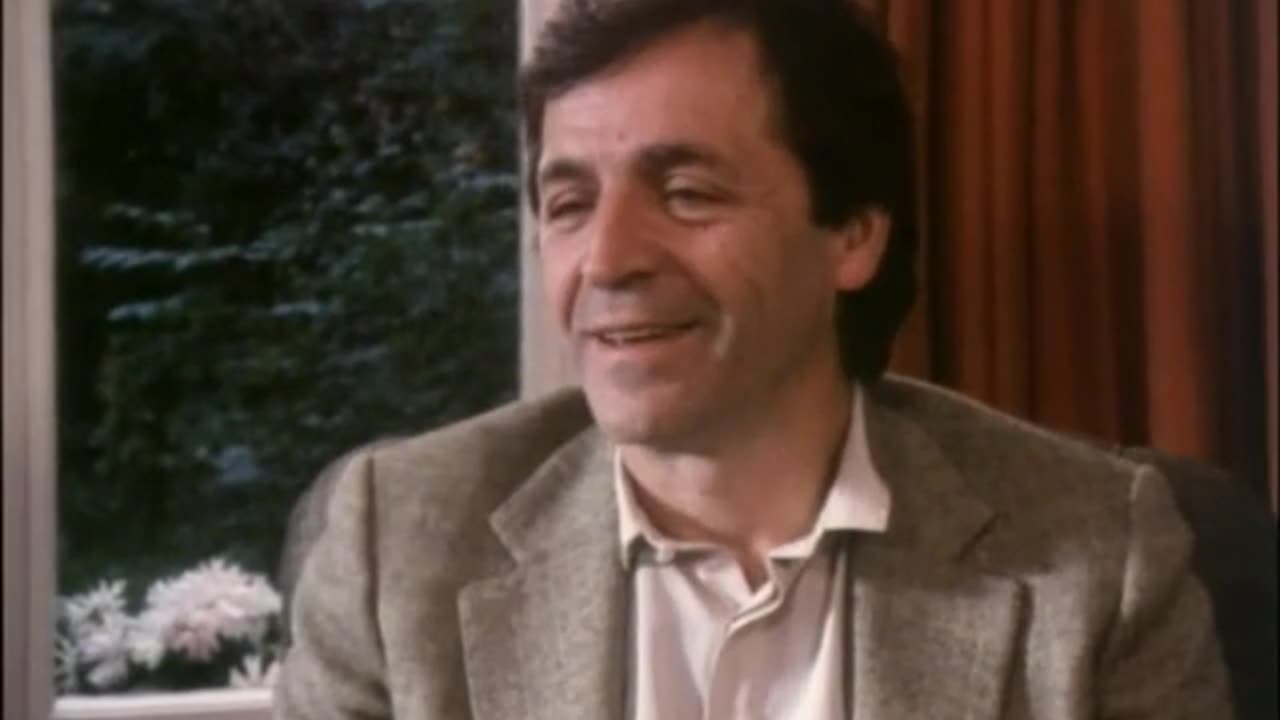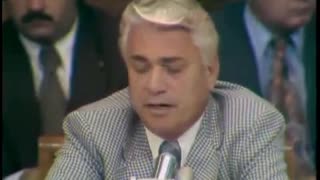Premium Only Content

Go Where It Is Impossible to Go: Costa-Gavras - Political Filmmaker
The dark side of history: https://thememoryhole.substack.com/
Konstantinos "Kostas" Gavras (Greek: Κωνσταντίνος "Κώστας" Γαβράς; born 12 February 1933), known professionally as Costa-Gavras, is a Greek-French film director, screenwriter, and producer who lives and works in France. He is known for political films, such as the political thriller Z (1969), which won an Academy Award for Best Foreign Language Film, and Missing (1982), for which he won the Palme d'Or and an Academy Award for Best Adapted Screenplay. Most of his films have been made in French, but six of them were made in English.
Early life
Costa-Gavras was born in Loutra Iraias, Arcadia. His family spent the Second World War in a village in the Peloponnese, and moved to Athens after the war. His father had been a member of the Pro-Soviet branch of the Greek Resistance, and was imprisoned during the Greek Civil War. His father's Communist Party membership made it impossible for Costa-Gavras to attend university in Greece or to be granted a visa to the United States, so after high school he settled in France, where he began studying literature at the Sorbonne in 1951.[1]
Early career
In 1956, he abandoned his university studies to study film at the French national film school, IDHEC. After film school, he apprenticed under Yves Allégret, and became an assistant director for Jean Giono and René Clair. After several further appointments as first assistant director, he directed his first feature film, Compartiment Tueurs, in 1965.[2]
Selected films
His 1967 film Shock Troops (Un homme de trop) was entered into the 5th Moscow International Film Festival.[3]
In Z (1969), an investigating judge, played by Jean-Louis Trintignant, tries to uncover the truth about the murder of a prominent leftist politician, played by Yves Montand, while government officials and the military attempt to cover up their roles. The film is a fictionalised account of the events surrounding the assassination of Greek politician Grigoris Lambrakis in 1963. It had additional resonance because, at the time of its release, Greece had been ruled for two years by the "Regime of the Colonels". Z won the Oscar for Best Foreign Language Film.[4] Costa-Gavras and co-writer Jorge Semprún won an Edgar Award from the Mystery Writers of America for Best Film Screenplay.
L'Aveu (The Confession, 1970) follows the path of Artur London, a Czechoslovakian communist minister falsely arrested and tried for treason and espionage in the Slánský 'show trial' in 1952.
State of Siege (1972) takes place in Uruguay under the civic-military dictatorship of Uruguay in the early 1970s. In a plot loosely based on the case of US police official and alleged torture expert Dan Mitrione, an American embassy official (played by Yves Montand) is kidnapped by the Tupamaros, a radical leftist urban guerilla group, which interrogates him in order to reveal the details of secret American support for repressive regimes in Latin America.
Missing, originally released in 1982 and based on the book The Execution Of Charles Horman, concerns an American journalist, Charles Horman (played by John Shea in the film), who disappeared in the 1973 coup d'état led by General Augusto Pinochet in Chile. Horman's father, played by Jack Lemmon, and wife, played by Sissy Spacek, search in vain to determine his fate. Nathaniel Davis, US ambassador to Chile from 1971 to 1973, a version of whose character had been portrayed in the movie (under a different name), filed a US$150 million libel suit, Davis v. Costa-Gavras, 619 F. Supp. 1372 (1985), against the studio and the director, which was eventually dismissed. The film won an Oscar for Best Screenplay Adaptation and the Palme d'Or at the Cannes Film Festival.
Betrayed (1988) is roughly based upon the terrorist activities of American neo-Nazi and white supremacist Robert Mathews and his group The Order.
In Music Box (1989), a respected Hungarian immigrant (Armin Mueller-Stahl) is accused of having commanded an Anti-Semitic death squad during World War II. His daughter, a Chicago defence attorney played by Jessica Lange, agrees to defend him at his denaturalization hearing. The film is inspired by the arrest and trial of Ukrainian immigrant John Demjanjuk and screenwriter Joe Eszterhas' realisation that his father had been a member of the Hungarian Arrow Cross Party. The film won the Golden Bear at the 40th Berlin International Film Festival.[5]
La Petite Apocalypse (1993) was entered into the 43rd Berlin International Film Festival.[6] Amen. (2003), was based in part on the highly controversial 1963 play, Der Stellvertreter. Ein christliches Trauerspiel (The Deputy, a Christian Tragedy), by Rolf Hochhuth. The film plot alleges that Pope Pius XII was aware of the plight of the Jews in Nazi concentration camps during World War II, but failed to take public action to publicise or condemn the Holocaust. Gavras won César Award for Best Writing for this film.
He was president of the Cinémathèque Française from 1982 to 1987, and again since 2007.
Political-commercial film
Costa-Gavras is known for merging controversial political issues with the entertainment value of commercial cinema. Law and justice, oppression, legal/illegal violence, and torture are common subjects in his work, especially relevant to his earlier films. Costa-Gavras is an expert of the "statement" picture. In most cases, the targets of Costa-Gavras's work have been right wing or far right movements and regimes, including the Greek military in Z, and right-wing dictatorships that ruled much of Latin America during the height of the Cold War, as in State of Siege and Missing.[citation needed]
In a broader sense, this emphasis continues with Amen. given its focus on the conservative leadership of the Catholic Church during the 1940s. In this political context, L'Aveu (The Confession) provides the exception, dealing as it does with oppression on the part of a Communist regime during the Stalinist period.[citation needed]
Issues and style
Costa-Gavras has brought attention to international issues, some urgent, others merely problematic, and he has done this in the tradition of cinematic story-telling. Z (1969), one of his most well-known works, is an account of the undermining in the 1960s of democratic government in Greece, his homeland and place of birth. The format, however, is a mystery-thriller combination that transforms an uncomfortable history into a fast-paced story. This is a clear example of how he pours politics into plot, "bringing epic conflicts into the sort of personal conflicts we are accustomed to seeing on screen."[citation needed]
His accounts of corruption propagated, in their essence, by European and American powers (Z, State of Siege and Missing) highlight problems buried deep in the structures of these societies, problems which he deems not everyone is comfortable addressing. The approach he adopted in L'Aveu also "subtly invited the audience to a critical look focused on structural issues, delving this time into the opposite Communist bloc."[citation needed]
Until 2019's Adults in the Room, Costa-Gavras had never worked in Greece or made a film in the Greek language.[citation needed]
Influences
When Costa-Gavras asked about some of his biggest cinematic influences, he replied:
The first movie I saw at the Cinematheque was Erich von Stroheim's Greed, and I was astonished to see you could do long movies with no happy ending. Kurosawa, no doubt, was a big influence. Movies sometimes more than directors have influenced me: The Grapes of Wrath, by John Ford, was an extraordinary discovery. Sergei Eisenstein, of course. Later on, [Ingmar] Bergman.[7]
He also listed René Clément,[8] Jacques Demy,[8] and Gillo Pontecorvo's film The Battle of Algiers as an influence on his filmmaking.[9]
According to his son Romain Gavras, Costa-Gavras used to show all of Tarkovsky's films to him at a young age.[10]
Legacy and influence
Costa-Gavras films have been a significant influence on political cinema. Wade Major of the Directors Guild of America mentioned that, "With films like Z and Missing, Costa-Gavras almost single-handedly created the modern political thriller".[11] When German Director Wim Wenders paid tribute to him in 2018 at the 31st European Film Awards in Seville, Spain, Wenders called him "One of the greatest filmmakers of our time."[12]
He has influenced directors such as Oliver Stone, William Friedkin, Steven Soderbergh, Rachid Bouchareb, Mathieu Kassovitz, and Ben Affleck.
Stone mentioned that Costa-Gavras "was certainly one of my earliest role models, ... I was a film student at NYU when Z came out, which we studied. Costa actually came over with Yves Montand for a screening and was such a hero to us. He was in the tradition of Gillo Pontecorvo's The Battle of Algiers and was the man in that moment ... it was a European moment."[13]
The American filmmaker William Friedkin listed Z as one of his favorite films and mentioned the film's influence on him when directing his film The French Connection: "After I saw Z, I realized how I could shoot The French Connection. Because he [Costa-Gavras] shot 'Z' like a documentary. It was a fiction film but it was made like it was actually happening. Like the camera didn't know what was gonna happen next. And that is an induced technique. It looks like he happened upon the scene and captured what was going on as you do in a documentary. My first films were documentaries too. So I understood what he was doing but I never thought you could do that in a feature at that time until I saw Z."[14]
The American filmmaker Steven Soderbergh listed Z as an inspiration on his film Traffic and even stated that he "wanted to make it like [Costa-Gavras's] Z".[15][16][17][18] In 2020, Costa Gavras wrote the preface to the book Opération Condor, by French writer and journalist Pablo Daniel Magee.
The French filmmaker Mathieu Kassovitz listed Costa-Gavras films (such as Z and The Confession) as influential to his work.[19]
The French filmmaker Rachid Bouchareb listed Z as an influence on his film Outside the Law.[20]
The American actor and filmmaker Ben Affleck listed Costa-Gavras's films as influences for his film Argo.[21]
Accolades
Main article: List of awards and nominations received by Costa-Gavras
Costa-Gavras's debut film, Compartiment Tueurs, won National Board of Review Award for Best Foreign Language Film and was nominated for the Edgar Award for Best Screenplay in 1967.
The film Z was the first film to be nominated for both the Best Picture and Best Foreign Language Film.[22] It won the latter, as well as the Jury Prize at the Cannes Film Festival, and the Golden Globe Award for Best Foreign Film. Z was also the first foreign-language film to win the Best Film award from the New York Film Critics Circle. Gavras won the Best Director award as well.[23]
Costa-Gavras has received an honorary doctorate from the Film School of the Aristotle University in 2013.
He was interviewed extensively by The Times cultural correspondent Melinda Camber Porter and was featured prominently in her book Through Parisian Eyes: Reflections on Contemporary French Arts and Culture (1993, Da Capo Press).
Costa-Gavras received the Magritte Honorary Award in 2013.[24] He was the first filmmaker to receive the Catalonia International Prize (2017).[25]
Personal life
His daughter Julie Gavras and his sons Romain Gavras and Alexandre Gavras are also directors. He is the first cousin of Penelope Spheeris, Jimmie Spheeris and Chris Spheeris.[26]
In 2009, Costa-Gavras signed a petition in support of film director Roman Polanski, calling for his release after Polanski was arrested in Switzerland in relation to his 1977 charge for drugging and raping a 13-year-old girl.[27]
Filmography
Main article: Costa-Gavras filmography
Films
Year English title Director Writer Producer Original title
1965 The Sleeping Car Murders Yes Yes No Compartiment tueurs
1967 Shock Troops Yes Yes Yes Un homme de trop
1969 Z Yes Yes No Z
1970 The Confession Yes No No L'Aveu
1972 State of Siege Yes Yes No État de siège
1975 Special Section Yes Yes Yes Section spéciale
1979 Womanlight Yes Yes No Clair de femme
1982 Missing Yes Yes No Missing.
1983 Hanna K. Yes Yes No Hanna K.
1986 Family Business Yes Yes No Conseil de famille
1988 Betrayed Yes No No Betrayed
1989 Music Box Yes No No Music Box
1993 The Little Apocalypse Yes Yes No La Petite Apocalypse
1997 Mad City Yes No No Mad City
2002 Amen. Yes Yes No Amen.
2005 The Axe Yes Yes No Le Couperet
2006 The Colonel No Yes Yes Mon colonel
2009 Eden Is West Yes Yes Yes Eden à l'ouest
2012 Capital Yes Yes No Le Capital
2019 Adults in the Room Yes Yes No Ενήλικοι στην Αίθουσα
References
"COSTA-GAVRAS | maquette-kg-nov2014". Archived from the original on 28 July 2020. Retrieved 30 September 2019.
"Biographie et Filmographie de COSTA-GAVRAS - Ciné Passion". Cinemapassion.com. Archived from the original on 1 October 2011. Retrieved 28 October 2011.
"5th Moscow International Film Festival (1967)". MIFF. Archived from the original on 16 January 2013. Retrieved 15 December 2012.
"The 42nd Academy Awards (1970) Nominees and Winners". oscars.org. Retrieved 16 November 2011.
"Berlinale: 1990 Prize Winners". berlinale.de. Retrieved 20 March 2011.
"Berlinale: 1993 Programme". berlinale.de. Retrieved 5 June 2011.
Ed Rampell (29 August 2013). "Costa-Gavras". The Progressive Magazine. The Progressive Inc. Retrieved 5 March 2023. "Q: "Who are some of your biggest cinematic influences?" Costa-Gavras: "The first movie I saw at the Cinematheque was [Erich von Stroheim's] Greed, and I was astonished to see you could do long movies with no happy ending. Kurosawa, no doubt, was a big influence. Movies sometimes more than directors have influenced me: The Grapes of Wrath, by John Ford, was an extraordinary discovery. Sergei Eisenstein, of course. Later on, [Ingmar] Bergman.""
John J. Michalczyk (1984). Costa-Gavras, the Political Fiction Film. Art Alliance Press. p. 33. ISBN 9780879820299. "In light of his international fame stemming from Z, Costa-Gavras was questioned as to which of the directors for whom he worked as assistant had the most influence on him. He replied: For me it was surely René Clément and Jacques Demy."
LaCinetek. "Costa-Gavras à propos de "La Bataille d'Alger" de Gillo Pontecorvo". YouTube. LaCinetek. Retrieved 11 April 2023.
Xan Brooks (16 September 2022). "Romain Gavras: 'My Dad fed me Tarkovsky from the age of seven'". The Guardian. Guardian News & Media Limited. Retrieved 5 March 2023.
Wade Major (Fall 2009). "World Class". DGA. Directors Guild of America. Retrieved 15 October 2021.
European Film Academy. "Costa-Gavras - Honorary Award of the EFA President and Board". YouTube. Retrieved 9 April 2023.
Major, Wade (Fall 2009). "World Class". DGA. Directors Guild of America. Retrieved 15 October 2021.
"William Friedkin's Favorite Films of all Time". YouTube. Fade In Magazine. Archived from the original on 12 December 2021. Retrieved 29 June 2021.
Steven Soderbergh (2002). "Ed Kelleher/1998". In Kaufman, Anthony (ed.). Steven Soderbergh - Interviews. University Press of Mississippi. p. 107. ISBN 9781578064298. Retrieved 12 July 2021.
Kaufman, Anthony, ed. (2015). Steven Soderbergh - Interviews, Revised and Updated. University Press of Mississippi. ISBN 9781626745407. Retrieved 12 July 2021.
Palmer, R. Barton; Sanders, Steven M., eds. (28 January 2011). The Philosophy of Steven Soderbergh. University Press of Kentucky. ISBN 9780813139890. Retrieved 12 July 2021. "Soderbergh called Traffic his "$47 million Dogme film" and used hand-held camera, available light, and (ostensibly) improvistational performance in an attempt to present a realistic story about illegal drugs. He prepared by analyzing two political films made in a realist style: Battle of Algiers (Gillo Pontecorvo, 1966) and Z (Constantin Costa-Gavras, 1969), both of which he described as having "that great feeling of things that are caught, instead of staged, which is what we were after.""
Mark Gallagher (4 April 2013). "Hollywood Authorship and Transhistorical Taste Cultures". Another Steven Soderbergh Experience - Authorship and Contemporary Hollywood. University of Texas Press. p. 55. ISBN 9780292748811. Retrieved 12 July 2021.
Will Higbee (2006). Mathieu Kassovitz. Manchester University Press. p. 11. ISBN 9780719071461. "One final and important influence from 1970s French Cinema is Costa-Gavras. A regular visitor to the apartment block where Kassovitz grew up – his son lived in the same building – Costa-Gavras was another of the filmmakers Kassovitz discovered through his parents: 'Môme, mon père m'a montré ses films et ce que j'ai fait a été influencé par des films comme Z ou L'Aveu. Des films forts, profonds, où l'on touch à des sujets importants, primordiaux' (Kassovitz 1998)."
Michael Gott; Leslie Kealhofer-Kemp (21 September 2020). ReFocus: The Films of Rachid Bouchareb. Edinburgh University Press. p. 107. ISBN 9781474466530. "When Bouchareb was asked specifically about the titles that influenced his controversial film Outside the Law (2010), he said: "It was a mix. A lot of political movies like Z by Costa-Gavras and Gillo Pontecorvo's The Battle of Algiers.""
Jennifer Vineyard (10 October 2012). "Ben Affleck on Why He Got to Look Hot in Argo". Vulture. Vox Media, LLC. Retrieved 11 April 2023. "Affleck: "I haven't done a movie that I haven't ripped off from another one! [Laughs.] This movie, we ripped off All the President's Men, for the CIA stuff, a John Cassavetes movie called The Killing of a Chinese Bookie, which we really used as a reference for the California stuff, and then there was kind of a Battle of Algiers, Z/Missing/Costa-Gavras soup of movies, that we used for the rest of it.""
Galuppo, Mia (13 January 2020). "Oscars: 'Parasite' Becomes Sixth Movie to Be Nominated for Both Best Picture, International Feature". The Hollywood Reporter. Retrieved 21 September 2020.
White, Armond (10 December 2009). "Z and the New York Film Critics Circle". The Criterion Collection. Retrieved 21 September 2020.
Crousse, Nicolas (10 January 2013). "Les Magritte fêteront Yolande Moreau et Costa-Gavras". Le Soir (in French). Retrieved 10 January 2013.
"Costa-Gavras, primer cineasta que gana el Premio Internacional Catalunya". La Vanguardia (in Spanish). 5 July 2017. Retrieved 2 October 2020.
"Costa Gavras". Biographicon.com. Archived from the original on 19 January 2012. Retrieved 22 February 2013.
"Le cinéma soutient Roman Polanski / Petition for Roman Polanski". Société des Auteurs et Compositeurs Dramatiques (in French). 28 September 2009. Archived from the original on 4 June 2012. Retrieved 29 August 2021.
Further reading
Costa-Gavras (2018). Va où il est impossible d'aller: Mémoires (in French). Paris: Éditions du Seuil. ISBN 978-2-02-139389-7.
Michalczyk, John J. (1984). Costa-Gavras: The Political Fiction Film. Philadelphia: Art Alliance Press. ISBN 0-87982-029-2.
Riambau, Esteve (2003). De traidores y héroes: El cine de Costa-Gavras (in Spanish). Valladolid: 48 Semana Internacional de Cine. ISBN 84-87737-49-8.
Rizza, Gabriele; Rossi, Giovanni Maria; Tassone, Aldo, eds. (2002). Il cinema di Costa-Gavras: Processo alla storia (in Italian). Firenze: Aida Edizioni. ISBN 88-8329-097-6.
External links
Wikimedia Commons has media related to Costa-Gavras.
Costa-Gavras at IMDb
Costa-Gavras at AllMovie
vte
Costa-Gavras
Filmography Awards
Films
The Sleeping Car Murders (1965) Shock Troops (1967) Z (1969) The Confession (1970) State of Siege (1972) Special Section (1975) Womanlight (1979) Missing (1982) Hanna K. (1983) Family Business (1986) Betrayed (1988) Music Box (1989) The Little Apocalypse (1993) Mad City (1997) Amen. (2002) The Axe (2005) Eden Is West (2009) Capital (2012) Adults in the Room (2019)
Short films
Against Oblivion (segment; 1991) À propos de Nice, la suite (segment; 1995) Lumière and Company (segment, 1995)
Related
Michèle Ray-Gavras Alexandre Gavras Julie Gavras Romain Gavras
Awards for Costa-Gavras
vte
Academy Award for Best International Feature Film
1947–1955
(Honorary)
1947: Shoeshine – Vittorio De Sica 1948: Monsieur Vincent – Maurice Cloche 1949: Bicycle Thieves – Vittorio De Sica 1950: The Walls of Malapaga – René Clément 1951: Rashomon – Akira Kurosawa 1952: Forbidden Games – René Clément 1953: No Award 1954: Gate of Hell – Teinosuke Kinugasa 1955: Samurai, The Legend of Musashi – Hiroshi Inagaki
1956–1975
1956: La Strada – Federico Fellini 1957: Nights of Cabiria – Federico Fellini 1958: My Uncle – Jacques Tati 1959: Black Orpheus – Marcel Camus 1960: The Virgin Spring – Ingmar Bergman 1961: Through a Glass Darkly – Ingmar Bergman 1962: Sundays and Cybèle – Serge Bourguignon 1963: 8½ – Federico Fellini 1964: Yesterday, Today and Tomorrow – Vittorio De Sica 1965: The Shop on Main Street – Ján Kadár & Elmar Klos 1966: A Man and a Woman – Claude Lelouch 1967: Closely Watched Trains – Jiří Menzel 1968: War and Peace – Sergei Bondarchuk 1969: Z – Costa-Gavras 1970: Investigation of a Citizen Above Suspicion – Elio Petri 1971: The Garden of the Finzi-Continis – Vittorio De Sica 1972: The Discreet Charm of the Bourgeoisie – Luis Buñuel 1973: Day for Night – François Truffaut 1974: Amarcord – Federico Fellini 1975: Dersu Uzala – Akira Kurosawa
1976–2000
1976: Black and White in Color – Jean-Jacques Annaud 1977: Madame Rosa – Moshé Mizrahi 1978: Get Out Your Handkerchiefs – Bertrand Blier 1979: The Tin Drum – Volker Schlöndorff 1980: Moscow Does Not Believe in Tears – Vladimir Menshov 1981: Mephisto – István Szabó 1982: Volver a Empezar ('To Begin Again') – José Luis Garci 1983: Fanny and Alexander – Ingmar Bergman 1984: Dangerous Moves – Richard Dembo 1985: The Official Story – Luis Puenzo 1986: The Assault – Fons Rademakers 1987: Babette's Feast – Gabriel Axel 1988: Pelle the Conqueror – Bille August 1989: Cinema Paradiso – Giuseppe Tornatore 1990: Journey of Hope – Xavier Koller 1991: Mediterraneo – Gabriele Salvatores 1992: Indochine – Régis Wargnier 1993: Belle Époque – Fernando Trueba 1994: Burnt by the Sun – Nikita Mikhalkov 1995: Antonia's Line – Marleen Gorris 1996: Kolya – Jan Svěrák 1997: Character – Mike van Diem 1998: Life Is Beautiful – Roberto Benigni 1999: All About My Mother – Pedro Almodóvar 2000: Crouching Tiger, Hidden Dragon – Ang Lee
2001–present
2001: No Man's Land – Danis Tanović 2002: Nowhere in Africa – Caroline Link 2003: The Barbarian Invasions – Denys Arcand 2004: The Sea Inside – Alejandro Amenábar 2005: Tsotsi – Gavin Hood 2006: The Lives of Others – Florian Henckel von Donnersmarck 2007: The Counterfeiters – Stefan Ruzowitzky 2008: Departures – Yōjirō Takita 2009: The Secret in Their Eyes – Juan José Campanella 2010: In a Better World – Susanne Bier 2011: A Separation – Asghar Farhadi 2012: Amour – Michael Haneke 2013: The Great Beauty – Paolo Sorrentino 2014: Ida – Paweł Pawlikowski 2015: Son of Saul – László Nemes 2016: The Salesman – Asghar Farhadi 2017: A Fantastic Woman – Sebastián Lelio 2018: Roma – Alfonso Cuarón 2019: Parasite – Bong Joon-ho 2020: Another Round – Thomas Vinterberg 2021: Drive My Car – Ryusuke Hamaguchi 2022: All Quiet on the Western Front – Edward Berger
vte
Academy Award for Best Adapted Screenplay
1928–1950
Benjamin Glazer (1928) Hanns Kräly (1929) Frances Marion (1930) Howard Estabrook (1931) Edwin J. Burke (1932) Victor Heerman and Sarah Y. Mason (1933) Robert Riskin (1934) Dudley Nichols (1935) Pierre Collings and Sheridan Gibney (1936) Heinz Herald, Geza Herczeg, and Norman Reilly Raine (1937) Ian Dalrymple, Cecil Arthur Lewis, W. P. Lipscomb, and George Bernard Shaw (1938) Sidney Howard (1939) Donald Ogden Stewart (1940) Sidney Buchman and Seton I. Miller (1941) George Froeschel, James Hilton, Claudine West, and Arthur Wimperis (1942) Philip G. Epstein, Julius J. Epstein, and Howard Koch (1943) Frank Butler and Frank Cavett (1944) Charles Brackett and Billy Wilder (1945) Robert Sherwood (1946) George Seaton (1947) John Huston (1948) Joseph L. Mankiewicz (1949) Joseph L. Mankiewicz (1950)
1951–1975
Harry Brown and Michael Wilson (1951) Charles Schnee (1952) Daniel Taradash (1953) George Seaton (1954) Paddy Chayefsky (1955) John Farrow, S. J. Perelman, and James Poe (1956) Pierre Boulle, Carl Foreman and Michael Wilson (1957) Alan Jay Lerner (1958) Neil Paterson (1959) Richard Brooks (1960) Abby Mann (1961) Horton Foote (1962) John Osborne (1963) Edward Anhalt (1964) Robert Bolt (1965) Robert Bolt (1966) Stirling Silliphant (1967) James Goldman (1968) Waldo Salt (1969) Ring Lardner Jr. (1970) Ernest Tidyman (1971) Francis Ford Coppola and Mario Puzo (1972) William Peter Blatty (1973) Francis Ford Coppola and Mario Puzo (1974) Bo Goldman and Lawrence Hauben (1975)
1976–2000
William Goldman (1976) Alvin Sargent (1977) Oliver Stone (1978) Robert Benton (1979) Alvin Sargent (1980) Ernest Thompson (1981) Costa-Gavras and Donald E. Stewart (1982) James L. Brooks (1983) Peter Shaffer (1984) Kurt Luedtke (1985) Ruth Prawer Jhabvala (1986) Bernardo Bertolucci and Mark Peploe (1987) Christopher Hampton (1988) Alfred Uhry (1989) Michael Blake (1990) Ted Tally (1991) Ruth Prawer Jhabvala (1992) Steven Zaillian (1993) Eric Roth (1994) Emma Thompson (1995) Billy Bob Thornton (1996) Curtis Hanson and Brian Helgeland (1997) Bill Condon (1998) John Irving (1999) Stephen Gaghan (2000)
2001–present
Akiva Goldsman (2001) Ronald Harwood (2002) Philippa Boyens, Peter Jackson, and Fran Walsh (2003) Alexander Payne and Jim Taylor (2004) Larry McMurtry and Diana Ossana (2005) William Monahan (2006) Joel Coen and Ethan Coen (2007) Simon Beaufoy (2008) Geoffrey S. Fletcher (2009) Aaron Sorkin (2010) Alexander Payne, Jim Rash, and Nat Faxon (2011) Chris Terrio (2012) John Ridley (2013) Graham Moore (2014) Adam McKay and Charles Randolph (2015) Barry Jenkins and Tarell Alvin McCraney (2016) James Ivory (2017) Charlie Wachtel, David Rabinowitz, Kevin Willmott and Spike Lee (2018) Taika Waititi (2019) Christopher Hampton and Florian Zeller (2020) Sian Heder (2021) Sarah Polley (2022)
vte
BAFTA Award for Best Screenplay
Calder Willingham and Buck Henry (1968) Waldo Salt (1969) William Goldman (1970) Harold Pinter (1971) Paddy Chayefsky / Larry McMurtry and Peter Bogdanovich (1972) Luis Buñuel and Jean-Claude Carrière (1973) Robert Towne (1974) Robert Getchell (1975) Alan Parker (1976) Woody Allen and Marshall Brickman (1977) Alvin Sargent (1978) Woody Allen and Marshall Brickman (1979) Jerzy Kosiński (1980) Bill Forsyth (1981) Costa-Gavras and Donald E. Stewart (1982)
vte
Cannes Film Festival Award for Best Director
1946–1975
René Clément (1946) René Clément (1949) Luis Buñuel (1951) Christian-Jaque (1952) Jules Dassin / Sergei Vasilyev (1955) Sergei Yutkevich (1956) Robert Bresson (1957) Ingmar Bergman (1958) François Truffaut (1959) Yuliya Solntseva (1961) Liviu Ciulei (1965) Sergei Yutkevich (1966) Ferenc Kósa (1967) Vojtěch Jasný / Glauber Rocha (1969) John Boorman (1970) Miklós Jancsó (1972) Michel Brault / Costa-Gavras (1975)
1976–2000
Ettore Scola (1976) Nagisa Ōshima (1978) Terrence Malick (1979) Werner Herzog (1982) Robert Bresson / Andrei Tarkovsky (1983) Bertrand Tavernier (1984) André Téchiné (1985) Martin Scorsese (1986) Wim Wenders (1987) Fernando Solanas (1988) Emir Kusturica (1989) Pavel Lungin (1990) Joel Coen (1991) Robert Altman (1992) Mike Leigh (1993) Nanni Moretti (1994) Mathieu Kassovitz (1995) Joel Coen (1996) Wong Kar-wai (1997) John Boorman (1998) Pedro Almodóvar (1999) Edward Yang (2000)
2001–present
Joel Coen / David Lynch (2001) Paul Thomas Anderson / Im Kwon-taek (2002) Gus Van Sant (2003) Tony Gatlif (2004) Michael Haneke (2005) Alejandro González Iñárritu (2006) Julian Schnabel (2007) Nuri Bilge Ceylan (2008) Brillante Mendoza (2009) Mathieu Amalric (2010) Nicolas Winding Refn (2011) Carlos Reygadas (2012) Amat Escalante (2013) Bennett Miller (2014) Hou Hsiao-hsien (2015) Olivier Assayas / Cristian Mungiu (2016) Sofia Coppola (2017) Paweł Pawlikowski (2018) Dardenne brothers (2019) Leos Carax (2021) Park Chan-wook (2022) Tran Anh Hung (2023)
vte
Donostia Award
Lifetime Achievement Award at the San Sebastián International Film Festival
1980s
1986: Gregory Peck / Gene Tierney 1987: Glenn Ford 1988: Vittorio Gassman 1989: Bette Davis
1990s
1990: Claudette Colbert 1991: Anthony Perkins 1992: Lauren Bacall 1993: Robert Mitchum 1994: Lana Turner 1995: Susan Sarandon / Catherine Deneuve 1996: Al Pacino 1997: Michael Douglas / Jeremy Irons 1998: Jeanne Moreau / Anthony Hopkins / John Malkovich 1999: Anjelica Huston / Fernando Fernán Gómez / Vanessa Redgrave
2000s
2000: Michael Caine / Robert De Niro 2001: Julie Andrews / Warren Beatty / Francisco Rabal 2002: Jessica Lange / Bob Hoskins / Dennis Hopper / Francis Ford Coppola 2003: Robert Duvall / Sean Penn / Isabelle Huppert 2004: Annette Bening / Jeff Bridges / Woody Allen 2005: Willem Dafoe / Ben Gazzara 2006: Max von Sydow / Matt Dillon 2007: Liv Ullmann / Richard Gere 2008: Meryl Streep / Antonio Banderas 2009: Ian McKellen
2010s
2010: Julia Roberts 2011: Glenn Close 2012: Oliver Stone / Ewan McGregor / Tommy Lee Jones / John Travolta / Dustin Hoffman 2013: Carmen Maura / Hugh Jackman 2014: Denzel Washington / Benicio del Toro 2015: Emily Watson 2016: Sigourney Weaver / Ethan Hawke 2017: Ricardo Darín / Monica Bellucci / Agnès Varda 2018: Hirokazu Kore-eda / Danny DeVito / Judi Dench 2019: Penélope Cruz / Costa-Gavras / Donald Sutherland
2020s
2020: Viggo Mortensen 2021: Johnny Depp / Marion Cotillard 2022: Juliette Binoche / David Cronenberg 2023: Javier Bardem / Víctor Erice / Hayao Miyazaki
vte
London Film Critics' Circle Award for Director of the Year
1980–2000
Nicolas Roeg (1980) Andrzej Wajda (1981) Costa-Gavras (1982) Andrzej Wajda (1983) Neil Jordan (1984) Roland Joffé (1985) Akira Kurosawa (1986) Stanley Kubrick (1987) John Huston (1988) Terence Davies (1989) Woody Allen (1990) Ridley Scott (1991) Robert Altman (1992) James Ivory (1993) Steven Spielberg (1994) Peter Jackson (1995) Joel Coen (1996) Curtis Hanson (1997) Peter Weir (1998) Sam Mendes (1999) Spike Jonze (2000)
2001–present
Alejandro González Iñárritu (2001) Phillip Noyce (2002) Clint Eastwood (2003) Martin Scorsese (2004) Ang Lee (2005) Paul Greengrass (2006) Paul Thomas Anderson (2007) David Fincher (2008) Kathryn Bigelow (2009) David Fincher (2010) Michel Hazanavicius (2011) Ang Lee (2012) Alfonso Cuarón (2013) Richard Linklater (2014) George Miller (2015) László Nemes (2016) Sean Baker (2017) Alfonso Cuarón (2018) Bong Joon-ho (2019) Steve McQueen (2020) Jane Campion (2021) Todd Field (2022)
vte
London Film Critics' Circle Award for Screenwriter of the Year
1980–2000
Steve Tesich (1980) Colin Welland (1981) Costa-Gavras and Donald E. Stewart (1982) Ruth Prawer Jhabvala (1983) Philip Kaufman (1984) Alan Bennett (1985) Woody Allen (1986) Alan Bennett (1987) David Mamet (1988) Christopher Hampton (1989) Woody Allen (1990) David Mamet (1991) Michael Tolkin (1992) Harold Ramis and Danny Rubin (1993) Quentin Tarantino (1994) Paul Attanasio (1995) Joel Coen and Ethan Coen (1996) Curtis Hanson and Brian Helgeland (1997) Andrew Niccol (1998) Alan Ball (1999) Charlie Kaufman (2000)
2001–present
Joel Coen and Ethan Coen (2001) Andrew Bovell (2002) John Collee and Peter Weir (2003) Charlie Kaufman (2004) Paul Haggis and Bobby Moresco (2005) Peter Morgan (2006) Florian Henckel von Donnersmarck (2007) Simon Beaufoy (2008) Jesse Armstrong, Simon Blackwell, Armando Iannucci, and Tony Roche (2009) Aaron Sorkin (2010) Asghar Farhadi (2011) Michael Haneke (2012) Joel Coen and Ethan Coen (2013) Wes Anderson (2014) Tom McCarthy and Josh Singer (2015) Kenneth Lonergan (2016) Martin McDonagh (2017) Deborah Davis and Tony McNamara (2018) Noah Baumbach (2019) Chloé Zhao (2020) Ryusuke Hamaguchi and Takamasa Oe (2021) Martin McDonagh (2022)
vte
New York Film Critics Circle Award for Best Director
1935–1950
John Ford (1935) Rouben Mamoulian (1936) Gregory La Cava (1937) Alfred Hitchcock (1938) John Ford (1939) John Ford (1940) John Ford (1941) John Farrow (1942) George Stevens (1943) Leo McCarey (1944) Billy Wilder (1945) William Wyler (1946) Elia Kazan (1947) John Huston (1948) Carol Reed (1949) Joseph L. Mankiewicz (1950)
1951–1975
Elia Kazan (1951) Fred Zinnemann (1952) Fred Zinnemann (1953) Elia Kazan (1954) David Lean (1955) John Huston (1956) David Lean (1957) Stanley Kramer (1958) Fred Zinnemann (1959) Jack Cardiff / Billy Wilder (1960) Robert Rossen (1961) No Award (1962) Tony Richardson (1963) Stanley Kubrick (1964) John Schlesinger (1965) Fred Zinnemann (1966) Mike Nichols (1967) Paul Newman (1968) Costa-Gavras (1969) Bob Rafelson (1970) Stanley Kubrick (1971) Ingmar Bergman (1972) François Truffaut (1973) Federico Fellini (1974) Robert Altman (1975)
1976–2000
Alan J. Pakula (1976) Woody Allen (1977) Terrence Malick (1978) Woody Allen (1979) Jonathan Demme (1980) Sidney Lumet (1981) Sydney Pollack (1982) Ingmar Bergman (1983) David Lean (1984) John Huston (1985) Woody Allen (1986) James L. Brooks (1987) Chris Menges (1988) Paul Mazursky (1989) Martin Scorsese (1990) Jonathan Demme (1991) Robert Altman (1992) Jane Campion (1993) Quentin Tarantino (1994) Ang Lee (1995) Lars von Trier (1996) Curtis Hanson (1997) Terrence Malick (1998) Mike Leigh (1999) Steven Soderbergh (2000)
2001–present
Robert Altman (2001) Todd Haynes (2002) Sofia Coppola (2003) Clint Eastwood (2004) Ang Lee (2005) Martin Scorsese (2006) Joel Coen and Ethan Coen (2007) Mike Leigh (2008) Kathryn Bigelow (2009) David Fincher (2010) Michel Hazanavicius (2011) Kathryn Bigelow (2012) Steve McQueen (2013) Richard Linklater (2014) Todd Haynes (2015) Barry Jenkins (2016) Sean Baker (2017) Alfonso Cuarón (2018) Joshua Safdie and Benjamin Safdie (2019) Chloé Zhao (2020) Jane Campion (2021) S. S. Rajamouli (2022) Christopher Nolan (2023)
vte
Writers Guild of America Award for Best Adapted Screenplay
Adapted Drama
(1969–1983)
Waldo Salt (1969) Robert Anderson (1970) Ernest Tidyman (1971) Francis Ford Coppola & Mario Puzo (1972) Waldo Salt & Norman Wexler (1973) Francis Ford Coppola & Mario Puzo (1974) Bo Goldman & Lawrence Hauben (1975) William Goldman (1976) Alvin Sargent (1977) Oliver Stone (1978) Robert Benton (1979) Alvin Sargent (1980) Ernest Thompson (1981) Costa-Gavras & Donald E. Stewart (1982) Julius J. Epstein (1983)
Adapted Comedy
(1969–1983)
Arnold Schulman (1969) Ring Lardner Jr. (1970) John Paxton (1971) Jay Presson Allen (1972) Alvin Sargent (1973) Lionel Chetwynd & Mordecai Richler (1974) Neil Simon (1975) Blake Edwards & Frank Waldman (1976) Larry Gelbart (1977) Elaine May & Warren Beatty (1978) Jerzy Kosiński (1979) Jim Abrahams, David Zucker & Jerry Zucker (1980) Gerald Ayres (1981) Blake Edwards (1982) James L. Brooks (1983)
Adapted Screenplay
(1984–present)
Bruce Robinson (1984) Richard Condon & Janet Roach (1985) Ruth Prawer Jhabvala (1986) Steve Martin (1987) Christopher Hampton (1988) Alfred Uhry (1989) Michael Blake (1990) Ted Tally (1991) Michael Tolkin (1992) Steven Zaillian (1993) Eric Roth (1994) Emma Thompson (1995) Billy Bob Thornton (1996) Curtis Hanson & Brian Helgeland (1997) Scott Frank (1998) Alexander Payne & Jim Taylor (1999) Stephen Gaghan (2000) Akiva Goldsman (2001) David Hare (2002) Shari Springer Berman & Robert Pulcini (2003) Alexander Payne & Jim Taylor (2004) Larry McMurtry & Diana Ossana (2005) William Monahan (2006) Joel Coen & Ethan Coen (2007) Simon Beaufoy (2008) Jason Reitman & Sheldon Turner (2009) Aaron Sorkin (2010) Alexander Payne, Jim Rash & Nat Faxon (2011) Chris Terrio (2012) Billy Ray (2013) Graham Moore (2014) Adam McKay & Charles Randolph (2015) Eric Heisserer (2016) James Ivory (2017) Nicole Holofcener & Jeff Whitty (2018) Taika Waititi (2019) Sacha Baron Cohen, Anthony Hines, Dan Swimer, Peter Baynham, Erica Rivinoja, Dan Mazer, Jena Friedman, Lee Kern & Nina Pedrad (2020) Sian Heder (2021) Sarah Polley (2022)
vte
Edgar Allan Poe Award for Best Motion Picture Screenplay
John Paxton (1946) Anthony Veiller (1947) John Paxton (1948) Jerome Cady, Jay Dratler, Leonard Hoffman and Quentin Reynolds (1949) Mel Dinelli and Cornell Woolrich (1950) Ben Maddow (1951) Michael Wilson (1952) Michael Wilson and Otto Lang (1953) Sydney Boehm (1954) John Michael Hayes (1955) Joseph Hayes (1956) Reginald Rose (1958) Nathan E. Douglas and Harold Jacob Smith (1959) Ernest Lehman (1960) Joseph Stefano (1961) William Archibald and Truman Capote (1962) Peter Stone (1964) Henry Farrell and Lukas Heller (1965) Paul Dehn and Guy Trosper (1966) William Goldman (1967) Stirling Silliphant (1968) Harry Kleiner and Alan Trustman (1969) Costa Gavras and Jorge Semprún (1970) Elio Petri and Ugo Pirro (1971) Ernest Tidyman (1972) Anthony Shaffer (1973) Anthony Perkins and Stephen Sondheim (1974) Robert Towne (1975) David Rayfiel and Lorenzo Semple, Jr. (1976) Ernest Lehman (1977) Robert Benton (1978) William Goldman (1979) Michael Crichton (1980) Joseph Wambaugh (1981) Jeffrey Alan Fiskin (1982) Barrie Keeffe (1983) Dennis Potter (1984) Charles Fuller (1985) William Kelley and Earl W. Wallace (1986) E. Max Frye (1987) Jim Kouf (1988) Errol Morris (1989) Daniel Waters (1990) Donald E. Westlake (1991) Ted Tally (1992) Michael Tolkin (1993) Ebbe Roe Smith (1994) Quentin Tarantino (1995) Christopher McQuarrie (1996) Billy Bob Thornton (1997) Curtis Hanson and Brian Helgeland (1998) Scott Frank and Elmore Leonard (1999) Guy Ritchie (2000) Stephen Gaghan and Simon Moore (2001) Christopher Nolan (2002) Bill Condon (2003) Steven Knight (2004) Jean-Pierre Jeunet and Sébastien Japrisot (2005) Stephen Gaghan and Robert Baer (2006) William Monahan (2007) Tony Gilroy (2008) Martin McDonagh (2009)
vte
Berlin International Film Festival jury presidents
1956–1975
Marcel Carné (1956) Jay Carmody (1957) Frank Capra (1958) Robert Aldrich (1959) Harold Lloyd (1960) James Quinn (1961) King Vidor (1962) Wendy Toye (1963) Anthony Mann (1964) John Gillett (1965) Pierre Braunberger (1966) Thorold Dickinson (1967) Luis García Berlanga (1968) Johannes Schaaf (1969) George Stevens (1970) Bjørn Rasmussen (1971) Eleanor Perry (1972) David Robinson (1973) Rodolfo Kuhn (1974) Sylvia Syms (1975)
1976–2000
Jerzy Kawalerowicz (1976) Senta Berger (1977) Patricia Highsmith (1978) Jörn Donner (1979) Ingrid Thulin (1980) Jutta Brückner (1981) Joan Fontaine (1982) Jeanne Moreau (1983) Liv Ullmann (1984) Jean Marais (1985) Gina Lollobrigida (1986) Klaus Maria Brandauer (1987) Guglielmo Biraghi (1988) Rolf Liebermann (1989) Michael Ballhaus (1990) Volker Schlöndorff (1991) Annie Girardot (1992) Frank Beyer (1993) Jeremy Thomas (1994) Lia van Leer (1995) Nikita Mikhalkov (1996) Jack Lang (1997) Ben Kingsley (1998) Ángela Molina (1999) Gong Li (2000)
2001–present
Bill Mechanic (2001) Mira Nair (2002) Atom Egoyan (2003) Frances McDormand (2004) Roland Emmerich (2005) Charlotte Rampling (2006) Paul Schrader (2007) Costa-Gavras (2008) Tilda Swinton (2009) Werner Herzog (2010) Isabella Rossellini (2011) Mike Leigh (2012) Wong Kar-wai (2013) James Schamus (2014) Darren Aronofsky (2015) Meryl Streep (2016) Paul Verhoeven (2017) Tom Tykwer (2018) Juliette Binoche (2019) Jeremy Irons (2020) M. Night Shyamalan (2022) Kristen Stewart (2023) Lupita Nyong'o (2024)
Authority control databases Edit this at Wikidata
International
FAST ISNI VIAF
National
Spain France BnF data Catalonia Germany Italy Israel Belgium United States Sweden Czech Republic Greece Korea Netherlands Poland
Artists
Museum of Modern Art
People
Deutsche Biographie
Other
SNAC IdRef
Categories:
1933 birthsLiving peopleBest Adapted Screenplay Academy Award winnersBest Screenplay BAFTA Award winnersCannes Film Festival Award for Best Director winnersEuropean Film Awards winners (people)Directors of Best Foreign Language Film Academy Award winnersDirectors of Palme d'Or winnersDirectors of Golden Bear winnersEdgar Award winnersEnglish-language film directorsFrench film directorsFrench people of Greek descentGreek communistsGreek film directorsGreek emigrants to FranceMagritte Award winnersWriters Guild of America Award winnersOfficers of the Ordre national du MériteCommanders of the Legion of HonourPeople from Iraia
-
 6:37:17
6:37:17
The Memory Hole
6 months agoNixon Impeachment Hearings Day 6 (1974-07-29)
1.11K -
 12:08
12:08
Zoufry
1 day agoThe Mystery of Gaddafi's Final 24 Hours
8.67K7 -
 18:25
18:25
Liberty Hangout
13 days agoAnti-Ice Demonstrators Love Poop!
44.4K49 -
 9:39
9:39
MattMorseTV
15 hours ago $1.05 earnedVance just DROPPED a BOMBSHELL.
40.2K63 -
 23:47
23:47
GritsGG
1 day agoThe Forgotten Best Sniper Support AR!
15.5K3 -
 1:15:48
1:15:48
The Pascal Show
17 hours ago $0.10 earnedMUGSHOTS RELEASED! Emmanuel Haro's Parents Mugshot Released To The Public
12.2K1 -
 14:45
14:45
BlabberingCollector
20 hours agoKings Cross Station SET LEAKS! | Harry Potter HBO Show Update & News
11.8K1 -
 33:20
33:20
SB Mowing
9 days agoHealth Struggles + Endless Rain = A Yard Out of Control
20K18 -
 1:09:42
1:09:42
Mike Rowe
4 days agoHow Did THIS Dirty Job Make Tommy Mello A Billionaire?! | #447 | The Way I Heard It
79.6K20 -
 10:11:30
10:11:30
SpartakusLIVE
13 hours agoThe BADDEST Duo in WZ Exhibits PEAK Physique || Duos w/ Sophiesnazz to start, quads later
178K1